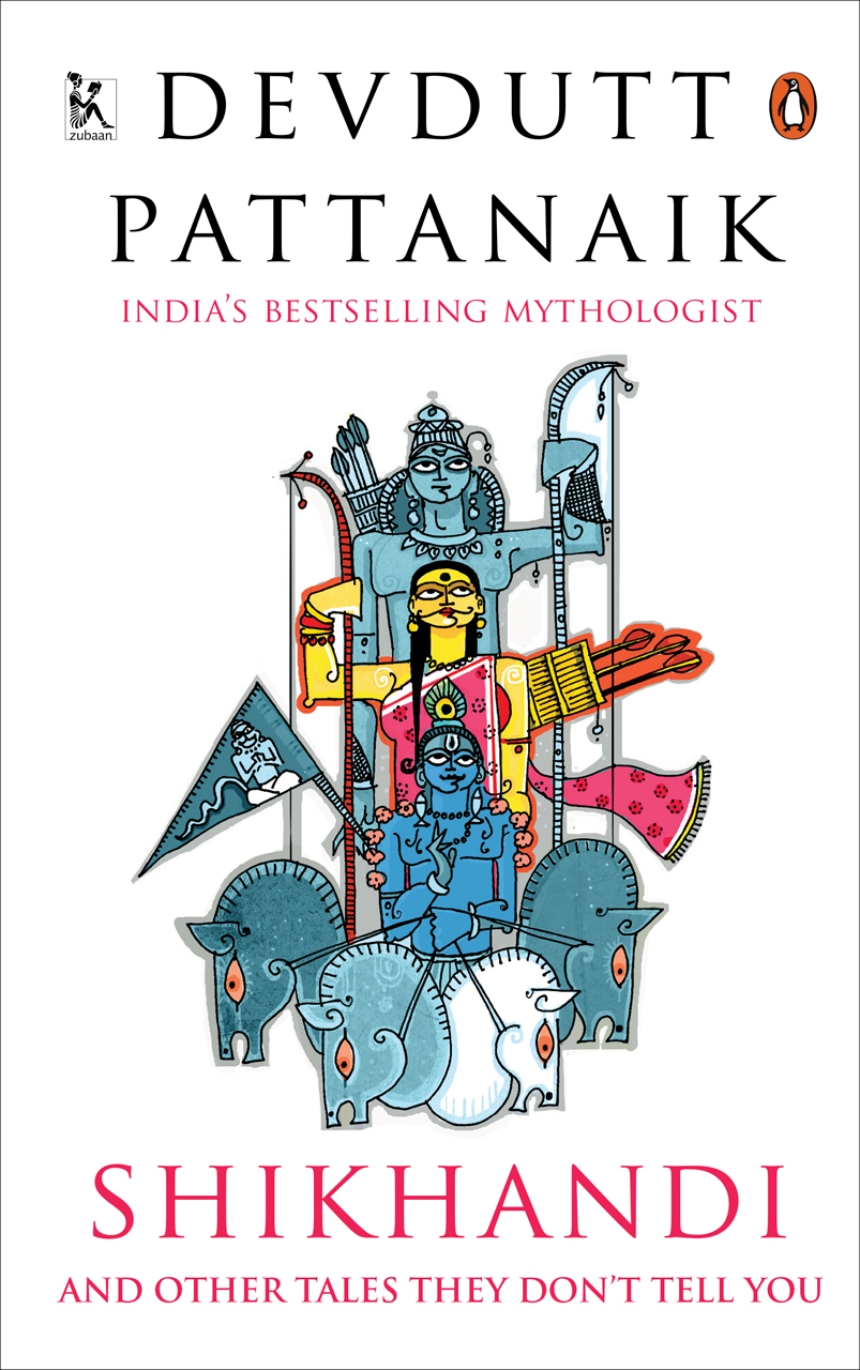Patriarchy asserts that men are superior to women, feminism clarifies that women and men are equal, and queerness questions what constitutes male and female. One of the few people to talk frankly and sensitively about queerness and religion, celebrated Indian mythologist Devdutt Pattanaik explains that queerness isn’t only modern, Western, or sexual. Rather, by looking at the vast written and oral traditions of Hinduism, he finds many overlooked tales with queerness at their center, some over two thousand years old. There’s Shikhandi, who became a man to satisfy her wife; Mahadeva, who became a woman to deliver her devotee’s child; Chudala, who became a man to enlighten her husband; Samavan, who became the wife of his male friend—and many, many more.
In Shikhandi, and Other Tales They Don’t Tell You, Pattanaik recounts these stories and explores the importance of mythologies in understanding the modern Indian mindset. Playful, touching, and sometimes disturbing, when Shikhandi’s stories are compared with their Mesopotamian, Greek, Chinese, and Biblical counterparts, they reveal the unique Indian way of making sense of queerness.
“Pattanaik is a master storyteller” —Bibek Debroy, translator of The Bhagavad Gita
In Shikhandi, and Other Tales They Don’t Tell You, Pattanaik recounts these stories and explores the importance of mythologies in understanding the modern Indian mindset. Playful, touching, and sometimes disturbing, when Shikhandi’s stories are compared with their Mesopotamian, Greek, Chinese, and Biblical counterparts, they reveal the unique Indian way of making sense of queerness.
“Pattanaik is a master storyteller” —Bibek Debroy, translator of The Bhagavad Gita
Table of Contents
About the Author
Dedication
Part I
Appreciating Queerness
The Discovery or Invention of Queerness
Part II
1: Shikhandi, who became a man to satisfy her wife
2: Mahadeva, who became a woman to deliver his devotee’s child
3: Chudala, who became a man to enlighten her husband
4: Vishnu, who became a woman to enchant gods, demons and a hermit
5: Kali, who became a man to enchant milkmaids
6: Gopeshwar, who became a woman to dance
7: Samavan, who became the wife of his male friend
8: Ratnavali, who became the companion of her female friend
9: Mandhata, whose mother was a man
10: Bhangashvana, who was a mother, and a man
11: Urvashi, who was born of no woman
12: Bhagirath, who was born of two women
13: Skanda, whose mothers were not all women
14: Aravan, whose wife was the complete man
15: Bahuchar , whose husband was an incomplete man
16: Arjuna, who was temporarily castrated for showing restraint
17: Indra, who was temporarily castrated for not showing restraint
18: Aruna, who became a woman when the sun paused
19: Ila, who became a man when the moon waned
20: Bhima, who wore women’s clothes to punish
21: Vijaya, who wore women’s clothes to conquer
22: Krishna, who wore women’s clothes in love
23: Samba, who wore women’s clothes as a prank
24: Alli, the queen who did not want a man in her bed
25: Kopperumcholan, the king who wanted a man in the adjacent tomb
26: Narada, who forgot he was a man
27: Pramila, who knew no man
28: Rishyashringa, who knew no woman
29: Shiva, who included the female in his male body
30: Ram, who included all in his kingdom
About Zubaan
About the Zubaan-Penguin joint list
Select Bibliography
Read More
Follow Penguin
Copyright
Dedication
Part I
Appreciating Queerness
The Discovery or Invention of Queerness
Part II
1: Shikhandi, who became a man to satisfy her wife
2: Mahadeva, who became a woman to deliver his devotee’s child
3: Chudala, who became a man to enlighten her husband
4: Vishnu, who became a woman to enchant gods, demons and a hermit
5: Kali, who became a man to enchant milkmaids
6: Gopeshwar, who became a woman to dance
7: Samavan, who became the wife of his male friend
8: Ratnavali, who became the companion of her female friend
9: Mandhata, whose mother was a man
10: Bhangashvana, who was a mother, and a man
11: Urvashi, who was born of no woman
12: Bhagirath, who was born of two women
13: Skanda, whose mothers were not all women
14: Aravan, whose wife was the complete man
15: Bahuchar , whose husband was an incomplete man
16: Arjuna, who was temporarily castrated for showing restraint
17: Indra, who was temporarily castrated for not showing restraint
18: Aruna, who became a woman when the sun paused
19: Ila, who became a man when the moon waned
20: Bhima, who wore women’s clothes to punish
21: Vijaya, who wore women’s clothes to conquer
22: Krishna, who wore women’s clothes in love
23: Samba, who wore women’s clothes as a prank
24: Alli, the queen who did not want a man in her bed
25: Kopperumcholan, the king who wanted a man in the adjacent tomb
26: Narada, who forgot he was a man
27: Pramila, who knew no man
28: Rishyashringa, who knew no woman
29: Shiva, who included the female in his male body
30: Ram, who included all in his kingdom
About Zubaan
About the Zubaan-Penguin joint list
Select Bibliography
Read More
Follow Penguin
Copyright
